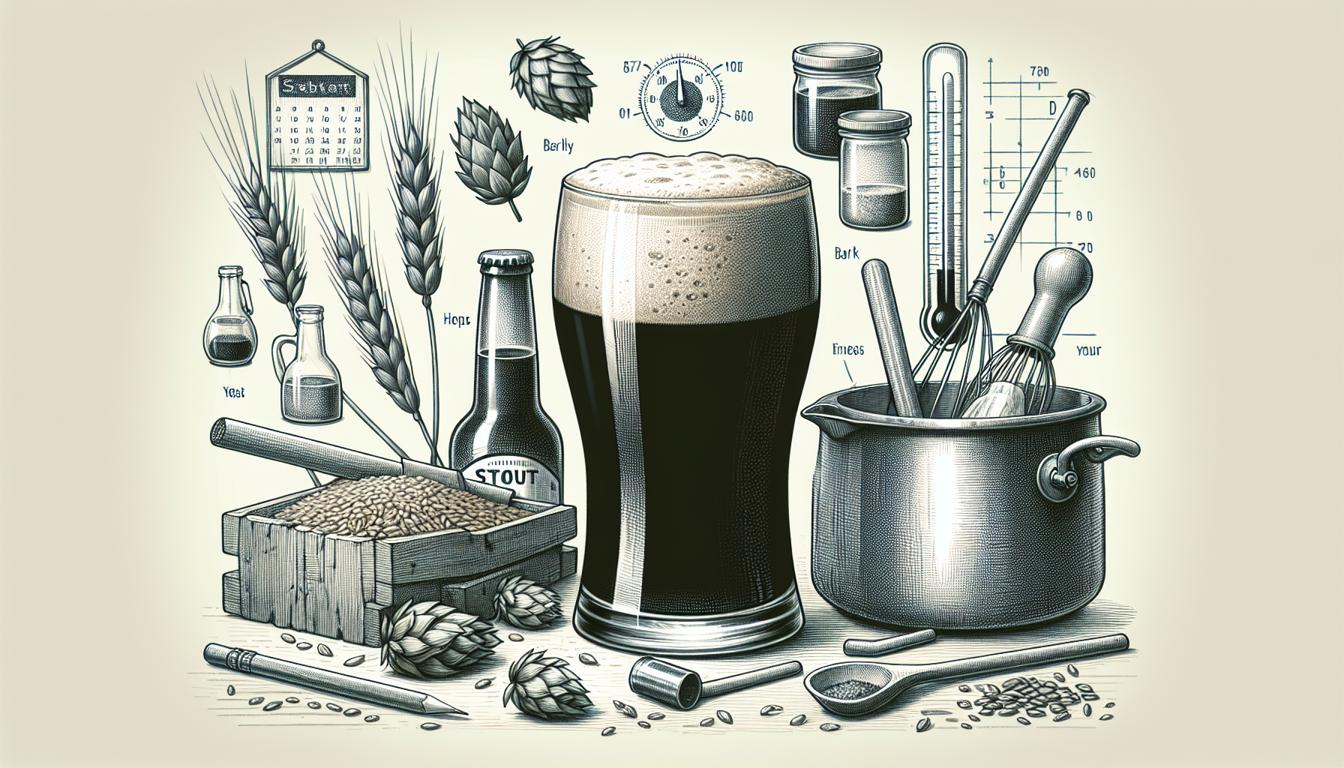Does home brewing save you money? The answer is both yes and no. It depends on various factors such as the type of beer you brew, the equipment you use, and how much you value your time.
As an avid home brewer, I’ll be sharing my personal experiences and insights to help you determine if home brewing can be a cost-effective hobby for you.
The Initial Investment
The first step to home brewing is to purchase the necessary equipment. This can range from a simple starter kit to a professional-grade brewing system.
A basic kit can cost around $100, while a high-end system can run into the thousands. The quality of your equipment will certainly affect the taste of your beer, but it’s not necessary to break the bank when you’re just getting started.
Moreover, these are one-time costs that can be spread out over many batches of beer.
The Cost of Ingredients
The cost of ingredients for home brewing can vary widely depending on the type of beer you want to make. A simple ale might cost around $20 to $30 in ingredients, while a complex stout or lager could run you up to $50.
However, you have to consider that you’re making 5 gallons of beer at a time, which is roughly equivalent to two cases of commercial beer. When you compare the cost per bottle, home brewing can be significantly cheaper.
Cider brewing as an example
I mostly brew cider, so I know my way around it. It will be pretty much the same for beer or wine, although you are less likely to grow your own ingredients for those. Malt is, however, cheaper to handle as soon as you get hold of it as it does not need grinding and pressing etc.
I did the math some time ago and heres a summary of what I found:
If you have your own apple tree, you can get started with cider brewing for as low as 50$ if you rent or borrow crushing and pressing equipment!
Otherwise, the cost of apple juice or a cider crusher and press comes on top.
Basic home brewing starting equipment costs
Well, you need some containers, for example, some demijohn bottles, some airlocks, cleaning reagents, sulfites, a hydrometer, and yeast.
| Item | Cost per piece | # needed | Total |
| Demijohn 1 Gal | 5$ | 2 | 10 |
| Airlocks | 2.5$ | 2 | 5 |
| Meta sulfite | 10$ | 1 | 10 |
| Yeast | 5$ | 1 | 5 |
| Cleaning agent | 10$ | 1 | 10 |
| Hydrometer etc. | 10$ | 1 | 10 |
| Total | 42.5$ | 8 pieces | 50$ |
A rough overview calculation of what cider brewing equipment costs.
The table shows the approximate costs of each item and some items like the demijohns, airlocks, and hydrometers can be used multiple times. So while these have a starting cost, they do not scale with production.
The cleaning reagent, yeast, and sulfites can only be used a limited amount of times and will scale with the number of gallons produces. I estimated these reagents to cost around 3$ per gallon.
On top of this, you will have to buy your own apple juice if you do not have access to your own apples and a juicer. I have estimated a cost of 5$ per gallon of store-bought juice.
I further assume that bottles can be salvaged/reused for free from friends, own consumption, reuse etc.
So how much do you save compared to store bought cider?
Using these numbers, I made a graph showing the cost of making apple cider and how this compares to buying the same amount of cider in the store:

From the chart shown above, we can see that the lines are much flatter for both home brewing options and of course slightly more expensive when you buy the apple juice.
However, we see that both home brewing options are on par with the expensive (50$/gallon) store-bought ciders already at 1 gallon and home brewing beats expensive store-bought cider at a more than 40$ margin already at 2 gallons made.
To beat the medium-priced and cheap store-bought hard cider though, you will need to make at least 3 gallons to beat the medium-priced cider and at 7 gallons you will have beaten the cheapest cider option with 10$ even if you have to buy your own apple juice!
And of course, the more you make at home with your starting equipment the cheaper it gets.
If you plan to make 15 gallons with store-bought apple juice, you will save at least 76$ if the alternative is buying the cheapest cider, 211$ for replacing the medium cost store cider, and a whopping 586$ if you make your own cider instead of buying the expensive cider in the liquor store!
And trust me, you can relatively easily make a cider that tastes as good as even the expensive store-bought cider if you follow the advice on this website!
Time is Money
One factor that often gets overlooked when considering the cost of home brewing is the value of your time. Brewing beer is a labor-intensive process that can take several hours, not including the time for fermentation and bottling. If you enjoy the process and view it as a rewarding hobby, then this time is well spent. However, if you’re looking at it purely from a cost perspective, you may find that your time is better spent elsewhere.
Economies of Scale
As with many hobbies, the more you brew, the more cost-effective it becomes. This is because the cost of equipment and ingredients can be spread out over more batches of beer. Moreover, buying ingredients in bulk can significantly reduce the cost per batch. So if you find that you enjoy home brewing and plan to do it regularly, you can save quite a bit of money in the long run.
Quality vs. Cost
One of the biggest advantages of home brewing is the ability to control the quality of your beer. You can choose high-quality ingredients and fine-tune your recipes to create a beer that suits your personal taste. While this may increase the cost per batch, many home brewers find that the improvement in quality is well worth the extra expense.
The Hidden Costs
There are also some hidden costs to home brewing that you should consider. For example, brewing beer can use a significant amount of water and electricity, which can add to your utility bills. Moreover, if you become serious about home brewing, you may find yourself investing in additional equipment such as kegs and refrigeration units.
Conclusion
To sum up, home brewing can save you money if you brew regularly and are willing to invest the time and effort. However, it’s not just about the cost. Most home brewers enjoy the process and take pride in creating their own unique beers. So whether you’re a budget-conscious beer lover or an aspiring brewmaster, home brewing can be a rewarding and cost-effective hobby.
Key Facts
1. Home brewing can be a cost-effective hobby if you brew regularly and buy ingredients in bulk.
2. The initial investment in brewing equipment can range from around $100 to several thousand dollars.
3. The cost of ingredients for a batch of home beer can range from $20 to $50, depending on the type of beer.
4. Home brewing is a time-intensive process, and the value of your time should be considered.
5. Buying ingredients in bulk can significantly reduce the cost per batch of beer.
6. Home brewing allows you to control the quality of your beer, which many home brewers find worth the extra expense.
7. There are hidden costs to home brewing, such as increased utility bills.
8. The more you brew, the more cost-effective home brewing becomes.
9. Professional-grade brewing systems can improve the quality of your beer but will also increase the cost.
10. Most home brewers enjoy the process and take pride in creating their own unique beers.
FAQs
How much money do you save brewing your own beer?
The amount of money you can save by brewing your own beer depends on various factors such as the ingredients you choose, equipment costs, and your brewing efficiency. On average, homebrewing can save you around 50% to 70% compared to buying commercial beers. However, it’s important to note that upfront costs for equipment and ingredients may offset the savings initially. Over time, as you refine your brewing process and reuse equipment, the cost per batch decreases, resulting in greater savings.
Are home brewing kits worth it?
Yes, home brewing kits are worth it for many reasons. They provide an accessible and convenient way to start brewing your own beer, wine, or other beverages at home. These kits typically come with all the necessary equipment and ingredients, making it easier for beginners to get started. Home brewing allows you to experiment with different flavors and styles, customize recipes to your taste, and gain a deeper appreciation for the craft of brewing. Additionally, it can be a cost-effective hobby in the long run, as brewing your own beverages can be cheaper than buying them commercially.
Do you save money brewing your own beer?
Yes, brewing your own beer can save you money in the long run. While there are initial costs involved in purchasing equipment and ingredients, brewing your own beer can be significantly cheaper than buying commercial beers. Additionally, brewing allows you to control the ingredients and flavors, providing a more personalized and cost-effective brewing experience.
What are the benefits of brewing your own beer?
Brewing your own beer offers several benefits. Firstly, it allows you to have complete control over the ingredients, flavors, and styles of beer you create. This means you can customize recipes to suit your taste preferences and experiment with unique combinations. Secondly, homebrewing can be a fun and rewarding hobby that allows you to learn about the brewing process and gain a deeper appreciation for beer. Additionally, brewing your own beer can save you money in the long run, as the cost per pint is generally lower compared to buying commercial beer. Lastly, homebrewing fosters a sense of creativity and community, as you can share your creations with friends and family, and even participate in homebrew competitions or join local brewing clubs.
Can you make beer cheaper than buying it?
Yes, it is possible to make beer cheaper than buying it, especially if you are willing to invest time and effort into homebrewing. By brewing your own beer, you can control the ingredients, quantities, and processes, which can result in significant cost savings compared to purchasing commercial beer. However, it’s important to consider the upfront costs of equipment and ingredients, as well as the learning curve involved in brewing.
Can I save money making my own beer?
Yes, making your own beer can save you money in the long run. While there will be some initial costs for equipment and ingredients, brewing your own beer can be more cost-effective compared to purchasing commercial beer. Additionally, homebrewing allows you to control the quality and flavors of your beer, providing a more personalized experience.


-recipe.jpg)

